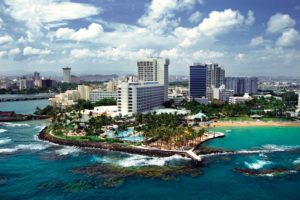Written By: Michael Joyce
This short work week has seen chaos with tax-free bonds issued by various issuers in Puerto Rico that led to double-digit losses in some longer-dated debt. However, this chaos may create opportunity to buy some of the stronger Puerto Rico credits at very attractive tax-free yields.
What started this turmoil was a law passed last week in Puerto Rico that would allow its public corporations to restructure their debts. This law would mainly apply to the three large public corporations, Puerto Rico Highways and Transportation Authority, Puerto Rico Aqueduct and Sewer Authority and Puerto Rico Electric Power Authority. These public corporations, which have a combined $20 billion of bond and bank debt outstanding, would be allowed to restructure their debt similar to that allowed in federal bankruptcy law if the public corporation is facing financial distress and cannot satisfy operating expenses, debt service obligations and the continuity of vital public services. Under federal law, the Commonwealth of Puerto Rico and their public corporations cannot declare municipal bankruptcy as the City of Detroit and Jefferson County, Alabama have done over the past few years. However, under the new Puerto Rico law a majority of the debt holders would have to agree to a restructuring and the restructuring would be subject to court approval.

The drop in Puerto Rico bond prices intensified on Wednesday July 2 when the credit rating agency, Moody’s, downgraded all Puerto Rico-issued debt, including the debt of the issuers who are not public corporations, to non-investment grade status.
This surprisingly broad downgrade, which includes the Puerto Rico Sales Tax Revenue bonds (the most secure credit in Puerto Rico), unnerved investors. There has been some panic selling that has been exacerbated by the short holiday week where there were few natural buyers.
Puerto Rico faces many challenges and many of the credits there have a high level of risk. The Commonwealth has a weak economy, budget deficits and underfunded pension plans. The Commonwealth has implemented a series of financial reforms during the past two years that have positively impacted its credit quality and growth prospects. These reforms include: overhauling the tax system, streamlining the island’s licensing and permitting process, reducing government expenditures, establishing a framework for public-private partnerships (essentially privatization of state assets), and several changes to the pension system.
It is important to note that not all credits in Puerto Rico are the same. The Sales Tax Revenue bonds (sometimes referred to as COFINA bonds). The revenues from these bonds are legally separated and segregated from the general fund of the Commonwealth of Puerto Rico. The Sales Tax Revenue bonds are not subject to the new law allowing public corporations to restructure their debts. Despite Moody’s surprising downgrade of the Sales Tax Revenue bonds, they are currently rated “A+” by both Standard and Poor’s and Fitch. We believe that the enhanced security of these bonds coupled with the sell off provide a very compelling tax-free yield (exempt from Federal, State, local and Obamacare taxes) for the short-term bonds we would consider.
